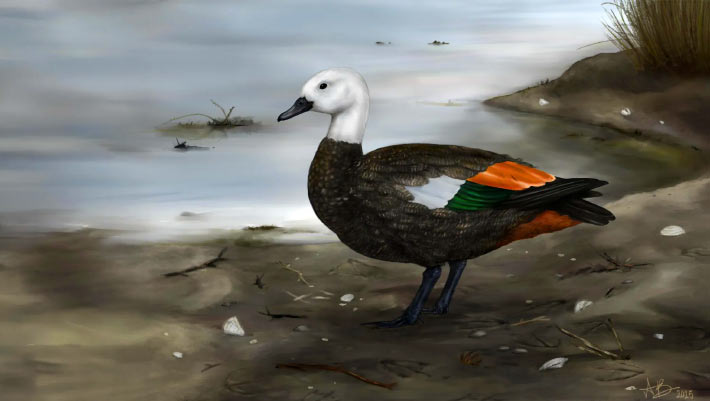Now Reading: Ancient Shelducks Settled Chatham Islands 390,000 Years Ago
-
01
Ancient Shelducks Settled Chatham Islands 390,000 Years Ago
Ancient Shelducks Settled Chatham Islands 390,000 Years Ago

Quick Summary
- A new extinct shelduck species, the Rēkohu shelduck (Tadorna rekohu), was described by researchers from New Zealand and Australia.
- Fossil bone deposits from the Chatham Islands were used to identify this bird, which existed during the Holocene era.
- The islands re-emerged less than 3 million years ago due to tectonic activity after being submerged in the Late Miocene-Early Pliocene period.
- Ancestors of this species arrived on the islands approximately 390,000 years ago during the Late Pleistocene and evolved unique characteristics:
– Shorter, more robust wings and longer leg bones suggest it was trending toward flightlessness due to environmental factors like abundant food and no predators.
– Adaptations favored ground dwelling over flying as flight is energetically expensive in stable environments.
- Ancient DNA analysis revealed its closest relative is New Zealand’s paradise shelduck (tadorna variegate).
- The Rēkohu shelduck became extinct before the 19th century, likely due to over-hunting by early Moriori settlers as indicated by bone findings in archaeological middens.
- Research findings were published in the Zoological Journal of the Linnean Society, July 2025 issue.
!Artistic reconstruction of a female Rēkohu Shelduck
Indian Opinion Analysis
The identification of new extinct species like Rēkohu shelduck underscores how isolated ecosystems considerably shape evolution. India’s own diverse climatic conditions-spanning island systems like Andaman & Nicobar-could hold similar revelations upon thorough exploration. Lessons about fragile ecosystems are also evident here; excessive hunting leading to extinction highlights critical conservation issues applicable globally.
For India specifically, these findings stress proactive biodiversity management at all levels-preventing habitat loss or species decline through controlled human activity.learning from how isolated island birds adapted might inspire deeper study into uniquely Indian flora and fauna adaptations influenced by distinct ecological niches.
























